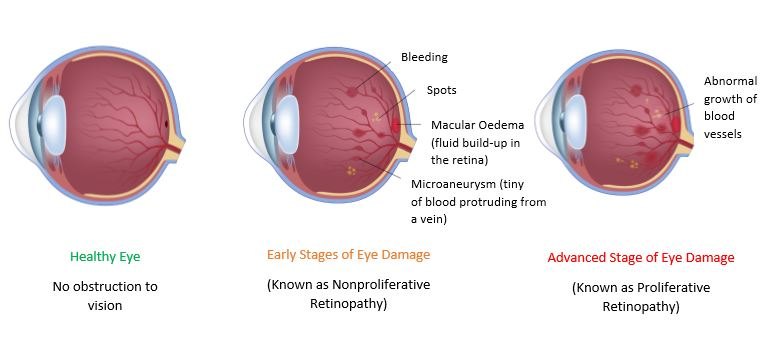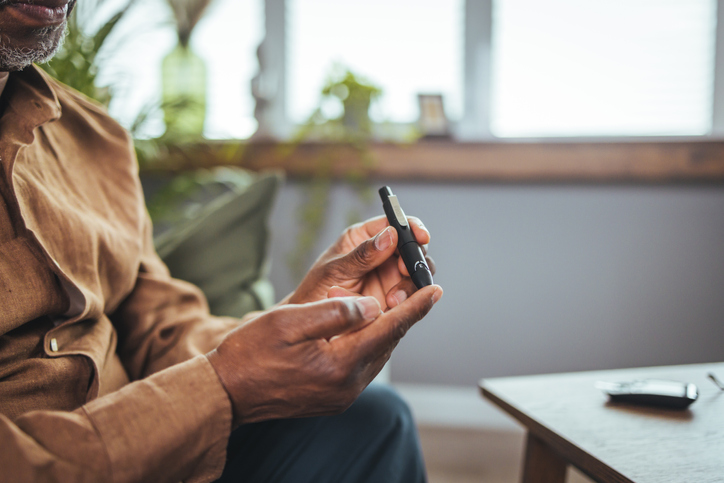What Is Diabetic Retinopathy and How Can You Avoid It?

People who have diabetes are at a higher risk of developing eye complications, specifically known as diabetic retinopathy. The images above show how diabetes-related eye problems can affect your vision. However, by taking an active role in managing your blood glucose you can reduce your risk of this happening.
What is diabetic retinopathy?
Retinopathy is damage to the retina, the innermost layer in the eyes. This can lead to loss of vision. Over time, high levels of glucose in the blood can damage the retina. The retina is a sensitive layer at the back of the eye that has many tiny blood vessels. These blood vessels can become damaged and leak. New blood vessels form in the retina to compensate. These blood vessels can easily leak too.
Imagine how easy it is to drink water through a thin straw. Now imagine how much harder it is to drink a thick milkshake through the same straw. Not easy at all! In the long term, these damaged blood vessels cause problems with vision and if left untreated can stop you seeing.
The longer you have unmanaged diabetes, the more likely you are to experience eye problems.
Eye health

Regular checks and general awareness
If you have diabetes, once a year, you will be invited to a free NHS retinopathy screening. It is essential that you attend these appointments. When you attend someone will put a special eye drop into your eyes. These eye drops dilate your pupil. For that reason take someone with you. Do not drive to your appointment as you will not be able to drive for a short while after. And don’t forget your sunglasses as your eyes will be a little sensitive to light after the test.
A picture of the back of your eye will be taken to detect any early signs of diabetic retinopathy. If required, you may need to see an eye specialist. Some people need eye treatment to preserve their vision. One treatment is known as laser therapy. This is where a beam of light makes tiny burns on the retina to stop blood vessels leaking and reduces the growth of new vessels.
But don’t wait for an appointment if you think you have a problem. Make an appointment with your healthcare professional if you experience:
- Sudden blurred vision
- Changes in normal vision
- Dark areas in normal vision
- Spots or blobs floating inside your eye
What can I do to prevent diabetic retinopathy?

There are many things you can do to help keep your eyes healthy and help prevent diabetic eye complications.
- Manage your blood glucose — Taking control of blood sugar can slow down or stop the progress of eye disease. If you haven’t noticed any problems yet, there is no reason why your eyes should be any worse than people who do not have diabetes. Check your blood sugar levels as advised by your healthcare professional.
- Take your meds — Remember to take any medication you have been prescribed to help manage your diabetes. Blood pressure and cholesterol levels should also be kept under control.
- Stop smoking — We all know that smoking is bad for our health, but in people with diabetes, it increases the risk of developing eye complications. Speak to your healthcare professional or visit NHS support.
- Stay healthy — Healthy eating and regular exercise will help keep your blood sugar levels stable and help with weight control. Find what works for you!
- Attend your regular check-ups, including any eye screening appointments.
Spirit Pharmacy is here to help
Our pharmacists are trained to support you in managing your diabetes. Register with Spirit Pharmacy to receive your medication. You will have access to a team who can answer your queries and help you with any challenges you may be facing because of poor eyesight. Confidential advice is available to all people registered with the pharmacy, as well as access to online diabetes education if you would like it.
Sign up to Spirit Pharmacy by clicking the Register button at the top of the screen.


